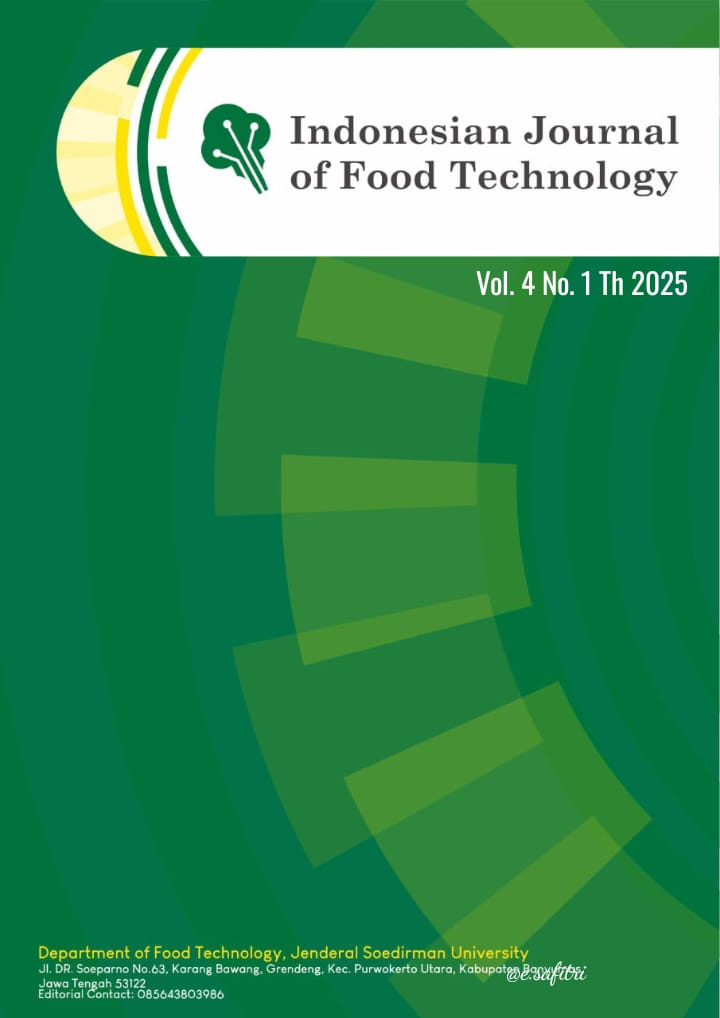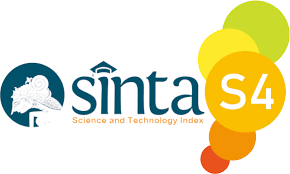Strategy for Achieving Production Target in Bakery Sejahtera Using the Fishbone Diagram
Abstract
The failure to achieve production targets has become the main challenge for UMKM Bakery Sejahtera in Sumedang Regency. This issue has the potential to reduce customer satisfaction and market trust. This study aims to analyze the factors contributing to this issue using a qualitative approach through interviews and observations. Data were analyzed using a Fishbone Diagram to identify root causes across six main aspects: manpower, methods, materials, machinery, measurement, and mother nature (enviroment). The findings indicate that a shortage of labor, limited machine capacity, delays and improper storage of raw materials, the absence of Standard Operating Procedures (SOPs), and environmental factors such as high room temperature and frequent power outages are the dominant causes. Recommendations include workforce addition, implementing more effective task distribution, adding one oven and one mixer of similar capacity, improving supplier relationships and diversifying sources, developing and applying clear SOPs for each production stage, introducing a more structured production monitoring and measurement system, and enhancing the working environment by improving ventilation, maintaining cleanliness, and preparing contingency plans for power outages.
References
Andiyanto, S., Sutrisno, A., & Punuhsingon, C. (2017). Penerapan Metode Fmea (Failure Mode and Effect Analysis) Untuk Kuantifikasi Dan Pencegahan Resiko Akibat Terjadinya Lean Waste. Jurnal Online Poros Teknik Mesin, 6(1), 45–57.
Aristriyana, E., & Ahmad Fauzi, R. (2023). Analisis Penyebab Kecacatan Produk Dengan Metode Fishbone Diagram Dan Failure Mode Effect Analysis (Fmea) Pada Perusahaan Elang Mas Sindang Kasih Ciamis. Jurnal Industrial Galuh, 4(2), 75–85. https://doi.org/10.25157/jig.v4i2.3021
Bakhtiar, B., Syarifuddin, S., & Putri, M. P. (2021). Pengukuran Beban Kerja Dengan Metode Full Time Equivalent Dan Penentuan Jumlah Tenaga Kerja Efektif Menggunakan Workload Analysis. Journal of Industrial Engineering and Operation Management, 4(1). https://doi.org/10.31602/jieom.v4i1.5332
Card, A. J. (2017). The problem with 5 whys’. BMJ Quality and Safety, 26(8), 671–677. https://doi.org/10.1136/bmjqs-2016-005849
Coccia, M. (2020). Fishbone diagram for technological analysis and foresight. International Journal of Foresight and Innovation Policy, 14(2–4), 225–247. https://doi.org/10.1504/ijfip.2020.111221
Gangidi, P. (2019). A systematic approach to root cause analysis using 3 × 5 why’s technique. International Journal of Lean Six Sigma, 10(1), 295–310. https://doi.org/10.1108/IJLSS-10-2017-0114
Gartlehner, G., Schultes, M. T., Titscher, V., Morgan, L. C., Bobashev, G. V., Williams, P., & West, S. L. (2017). User testing of an adaptation of fishbone diagrams to depict results of systematic reviews. BMC Medical Research Methodology, 17(1), 1–9. https://doi.org/10.1186/s12874-017-0452-z
Iasha Fahira Islami, S. N. R. (2022). Pengamatan Pengendalian Berat Susu Kambing Etawa Bubuk Di CV TSR Menggunakan Metode Control Chart dan Diagram Fishbone. Jurnal Teknologi Pangan Dan Agroindustri Perkebunan, 4044, 86–93.
Kumah, A., Nwogu, C. N., Issah, A. R., Obot, E., Kanamitie, D. T., Sifa, J. S., & Aidoo, L. A. (2024). Cause-and-Effect (Fishbone) Diagram: A Tool for Generating and Organizing Quality Improvement Ideas. Global Journal on Quality and Safety in Healthcare, 7(2), 85–87. https://doi.org/10.36401/JQSH-23-42
Li, S. S., & Lee, L. C. (2011). Using fishbone analysis to improve the quality of proposals for science and technology programs. Research Evaluation, 20(4), 275–282. https://doi.org/10.3152/095820211X13176484436050
Luo, T., Wu, C., & Duan, L. (2018). Fishbone diagram and risk matrix analysis method and its application in safety assessment of natural gas spherical tank. Journal of Cleaner Production, 174, 296–304. https://doi.org/10.1016/j.jclepro.2017.10.334
Marendha, G. A., Susanto, T. D., & Arifiana, Y. (2016). Hubungan Multitasking Teknologi Informasi Terhadap Produktivitas Kerja. 5(2), 3–7.
Mario. (2017). Social and Administrative Sciences - The Fishbone diagram to identify, systematize and analyze the sources of general purpose technologies. Journal of Social and Administrative Sciences, 4(December 2017), 291–303. https://doi.org/10.1453/jsas.v4i4.1518
Novita Ramadhan, H., Kesehatan Kerja Dan Beban Kerja Terhadap, P., Buana Irfana, T., Thamrin, D., Siahaan, M., & Ekonomi dan Bisnis Universitas Bhayangkara Jakarta Raya, F. (2024). Work Life Balance (Studi Kasus PT. Citra Mediatama Indonesia). Jurnal Penelitian Ekonomi Manajemen Dan Bisnis (JEKOMBIS), 3(2), 2963–8194. https://doi.org/10.55606/jekombis.v3i2.3491
Owalla, B., Gherhes, C., Vorley, T., & Brooks, C. (2022). Mapping SME productivity research: a systematic review of empirical evidence and future research agenda. Small Business Economics, 58(3), 1285–1307. https://doi.org/10.1007/s11187-021-00450-3
Rahmawati, F., Nazhifah Suryana, N., Gegerkalong Hilir, J., Parongpong, K., Bandung Barat, K., & Barat, J. (2024). Pentingnya Standar Operasional Prosedur (SOP) Dalam Meningkatkan Efisiensi Dan Konsistensi Operasional Pada Perusahaan Manufaktur D4 Administrasi Bisnis/Administrasi Niaga Politeknik Negeri Bandung. Jurnal Manajemen Bisnis Digital Terkini (JUMBIDTER), 1(3), 2–15. https://doi.org/10.61132/jumbidter.v1i2.112
Setiawan, B. (2018). Edukasi E-Commerce Pada Pelaku Usaha Mikro, Kecil Dan Menengah (Umkm) Di Kota Palembang. Jurnal Abdimas Mandiri, 2(2), 106–110. https://doi.org/10.36982/jam.v2i2.531
Shinde, D. D., Ahirrao, S., & Prasad, R. (2018). Fishbone Diagram: Application to Identify the Root Causes of Student–Staff Problems in Technical Education. Wireless Personal Communications, 100(2), 653–664. https://doi.org/10.1007/s11277-018-5344-y
Zakharia, F., Adiputra, F., & Meko, P. (2023). Peranan Metode Penyimpanan Bahan Makanan Dalam Meningkatkan Kualitas Makanan Di Hotel Bintang Labuhan Bajo Flores. Jurnal Ilmiah Global Education, 4(4), 2153–2162. https://doi.org/10.55681/jige.v4i4.1468











